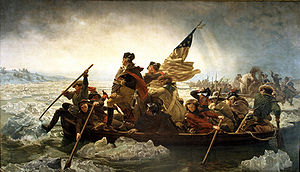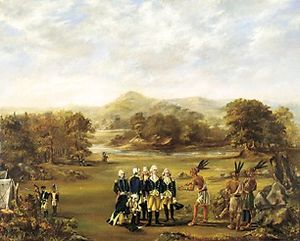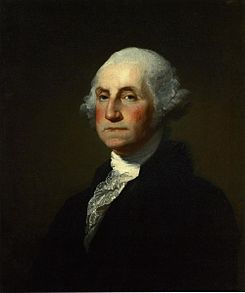| |
Date |
Event(s) |
| 1 | 1772 | - 1772—1772: First Travellers' Cheques issued by the London Credit Exchange Company
- 1772—1772: Morning Post' first published (until 1937)
- 14 May 1772—14 May 1772: Judge Mansfield rules that there is no legal basis for slavery in England
|
| 2 | 1774 | - 13 Sep 1774—13 Sep 1774: Cook arrives on Easter Island
|
| 3 | 1775 | - 19 Apr 1775—19 Apr 1775: Battle of Lexington: first action in American War of Independence (1775- 1783)
- 19 Apr 1775—3 Sep 1783:
 American Revolutionary War American Revolutionary War
|
| 4 | 1776 | - 1776—1776: Somerset House in London becomes the repository of records of population
- 1776—1776: Watt and Boulton produce their first commercial steam engine
- 4 Jul 1776—4 Jul 1776: American Declaration of Independence
- 7 Sep 1776—7 Sep 1776: First attack on a warship by a submarine - David Bushnell's ?Turtle' attacked
HMS Eagle in New York harbour. The attack was perhaps spectacular (a charge did
detonate beneath the ship) but was nevertheless unsuccessful. 'Turtle' was a one man
Affair man-powered [Les Moore]
|
| 5 | 1777 | - 1777—1777: Samuel Miller of Southampton patents the circular saw.
|
| 6 | 1779 | - 1779—1779: Marc Isambard Brunel opens the first steamdriven sawmill at Chatham Dockyard in Kent
- 1779—1779: First iron bridge built, over the Severn by John Wilkinson
- 1779—1779: First Spinning Mills operational in Scotland
- 14 Feb 1779—14 Feb 1779: Capt James Cook killed on Hawaii
- 23 Sep 1779—23 Sep 1779: Naval engagement between Britain and USA off Flamborough Head
|
| 7 | 1780 | - 1780—1780: Male Servants Tax
- 1780—1780: The English Reform Movement - until now, only landowners and tenants (freeholders
with 40 shillings per year or more) allowed to vote, and in open poll books
- 1780—1780: Fountain pen invented
- 1780—1780: About this time the word 'Quiz' entered the language, said to have been invented as a
wager by Mr Daly, a Dublin theatre manager
- 4 May 1780—4 May 1780: First Derby run at Epsom (some say 2nd June)
- 2 Jun 1780—2 Jun 1780: Jun 2- 8: The Gordon Riots - Parliament passes a Roman Catholic relief measure - for
days, London is at the mercy of a mob and destruction is widespread
|
| 8 | 1782 | - 1782—1782: Gilbert's Act establishes outdoor poor relief - the way of life of the poor beginning to
alter due to industrialisation - New factories in rapidly expanding towns required a workforce
that would adjust to new work patterns
- 1782—1782: James Watt patents his steam engine
|
| 9 | 1783 | - 1783—1783: Duty payable on Parish Register entries (3d per entry - repealed 1794) - led to a fall in
entries!
- 3 Sep 1783—3 Sep 1783: Treaty of Versailles (Britain/US)
- 3 Nov 1783—3 Nov 1783: Last public execution at Tyburn in London (John Austin, a highwayman)
|
| 10 | 1784 | - 1784—1784: Pitt's India Act - the Crown (as opposed to officers of the East India Company) has
power to guide Indian politics
- 1784—1784: Wesley breaks with the Church of England
- 1784—1784: First golf club founded at St Andrews
- 1784—1784: Invention of threshing machine by Andrew Meikle
- 2 Aug 1784—2 Aug 1784: First mail coaches in England (4pm Bristol / 8am London)
|
| 11 | 1785 | - 1785—1785: Sunday School Society founded to educate poor children (by 1851, enrols more than 2
million)
- 1785—1795:
 Northwest Indian War Northwest Indian War
- 1 Jan 1785—1 Jan 1785: John Walter publishes first edition of The Times (called The Daily Universal
Register for 3 years)
|
| 12 | 1787 | - 1787—1787: MCC (Marylebone Cricket Club) established at Thomas Lord's ground in London
|
| 13 | 1788 | - 1788—1788: First steamboat demonstrated in Scotland
- 1788—1788: Law passed requiring that chimney sweepers be a minimum of 8 years old (not
enforced)
- 1788—1788: First slave carrying act, the Dolben Act of 1788, regulates the slave trade - stipulates
more humane conditions on slave ships
- 1788—1788: King George III's mental illness occasions the Regency Crisis - Edmund Burke and
Charles James Fox attack ministry of William Pitt - trying to obtain full regal powers for the
Prince of Wales
- 1788—1788: Gibbon completes Decline and Fall of the Roman Empire'
- 26 Jan 1788—26 Jan 1788: First convicts (and free settlers) arrive in New South Wales (left Portsmouth 13
May 1787) ? the 'First Fleet'; eleven ships commanded by Captain Arthur Phillip
|
| 14 | 1789 | - 28 Apr 1789—28 Apr 1789: Mutiny on HMS Bounty - Captain William Bligh and 18 sailors are set adrift
and the rebel crew ends up on Pitcairn Island
- 30 Apr 1789—4 Mar 1797:
 George Washington U.S. Presidency George Washington U.S. Presidency
|
| 15 | 1790 | - 1790—1790: Forth and Clyde Canal opened in Scotland
|
| 16 | 1791 | - 1791—1791: John Bell, printer, abandons the long s' (the 's' that looks like an 'f')
- 1791—1791: Establishment of the Ordnance Survey of Great Britain
- 4 Dec 1791—4 Dec 1791: First publication of The Observer - world's oldest Sunday newspaper
|
| 17 | 1792 | - 1792—1792: Repression in Britain (restrictions on freedom of the press) - Fox gets Libel Act through
Parliament, requiring a jury and not a judge to determine libel
- 1792—1792: Boyle's Street Directory published
- 1792—1792: Coal-gas lighting invented by William Murdock, an Ayrshire Scot
- 1 Oct 1792—1 Oct 1792: Introduction of Money Orders in Britain
- 1 Dec 1792—1 Dec 1792: King's Proclamation drawing out the British militia
|
| 18 | 1793 | - 11 Feb 1793—11 Feb 1793: Britain declares war on France (1793-1802)
- 15 Apr 1793—15 Apr 1793: ?5 notes first issued by the Bank of England
|



 Submit Photo / Document
Submit Photo / Document
